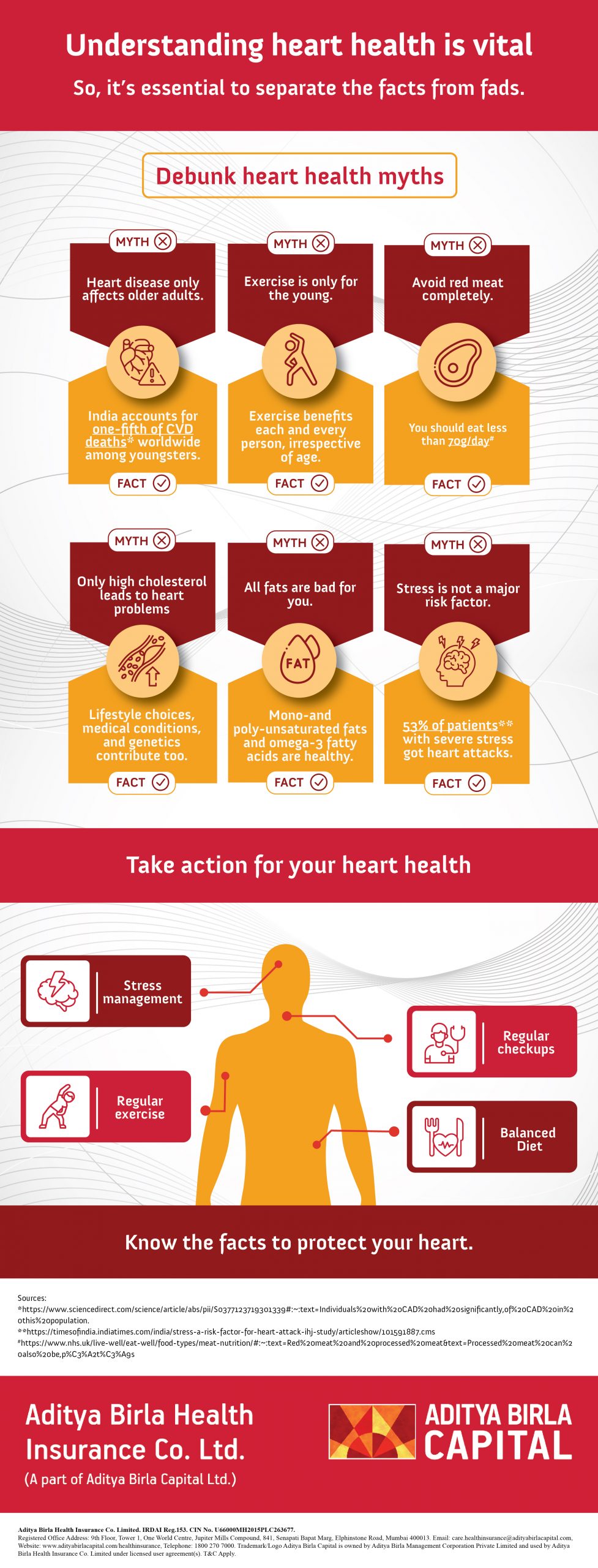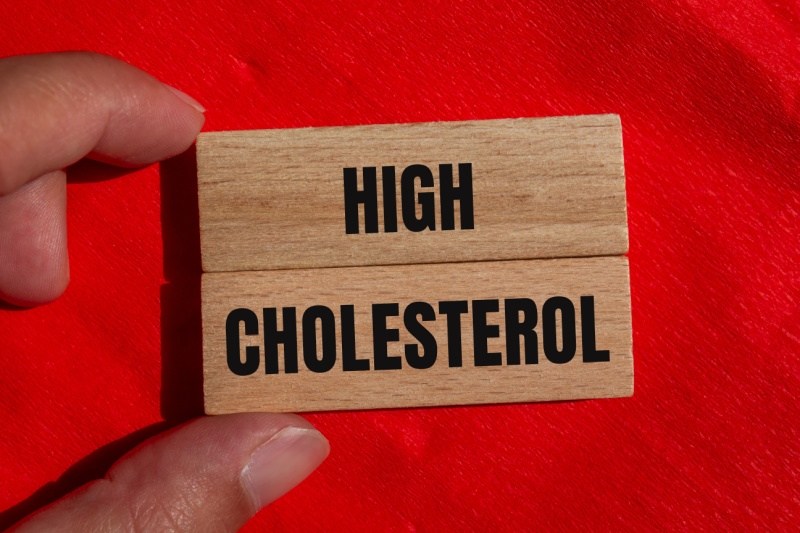
Heart health is a topic surrounded by numerous myths and misconceptions that can lead to confusion and potentially harmful decisions. Don’t hold on to these incorrect beliefs; instead, know the facts and address common myths about heart health.
What you need to know:
6 Common myths about heart health
Myth 1: Heart disease only affects older adults
While age is a factor that can make you more prone to heart disease, in recent times, owing to lifestyle changes, even youngsters are at a higher risk of heart disease. Being proactive with your health is always a smart idea and crucial in the case of heart health. A study of hundreds of heart attack hospitalizations found that 30% of the patients were between the ages of 35 and 54. Another finding of the investigation was the rise in hospitalizations among young people due to heart problems. Underlying reasons include a sedentary lifestyle, eating junk food, a disturbed sleeping pattern because of doom scrolling, etc.
Myth 2: Only high cholesterol leads to heart problems

While high levels of ‘bad’ cholesterol can be a major risk factor for heart disease, heart attack, and stroke, it can also occur due to lifestyle choices, medical conditions, and genetics:
- Lifestyle choices – include smoking, unhealthy diet, heavy alcohol use, lack of physical activity, and using illegal drugs.
- Medical conditions – include high blood pressure, diabetes, and heart or blood vessel conditions.
- Genetic conditions – can cause congenital heart disease. Down’s syndrome is one genetic condition that can cause congenital heart disease.
- Other factors – Aging can weaken and stiffen the heart, and a family history of heart failure can also increase the risk. Traffic noise can also increase blood pressure and the likelihood of heart failure. Some medicines, such as certain diabetes drugs, nonsteroidal anti-inflammatory drugs (NSAIDs), and those used to treat high blood pressure, can also increase the risk of heart failure.
Myth 3: Stress is not a major risk factor
Stress plays a significant role in cardiovascular health, and chronic stress can be harmful to the heart. Here’s how stress affects the heart’s health:
- Increased blood pressure: Stress can cause temporary blood pressure spikes, contributing to long-term high blood pressure, a known risk factor for heart disease.
- Unhealthy habits: People under stress might turn to unhealthy coping mechanisms such as overeating, smoking, or excessive drinking, which can further increase the risk of heart disease.
- Inflammation: Chronic stress can lead to inflammation in the body, which is linked to atherosclerosis (hardening of the arteries), a major cause of heart attacks.
- Heart rate variability: Stress can affect the autonomic nervous system, reducing heart rate variability and putting more strain on the heart.
- Direct effects of stress: In some cases, severe stress can lead to conditions like stress cardiomyopathy, also known as ‘broken heart syndrome,’ which can mimic the symptoms of a heart attack.
Myth 4: All fats are bad for you
Not all fats are bad for you. Some fats are good for you:
- A small amount of fat is necessary for a balanced diet, and some fats are good for your heart. These include monounsaturated and polyunsaturated fats, especially omega-3 fats, in fatty fish, nuts, and seeds.
- Saturated and trans fats are bad for you. Too much of them in your diet can increase your risk of heart and circulatory diseases. These fats are found in baked foods, meat, beef, and processed foods.
Myth 5: Red meat should be avoided at all costs
While red meat is a good source of protein, vitamins, and minerals, it’s not always bad for your heart. However, eating a lot of red meat can increase your risk of cardiovascular disease. Here are some tips for healthily eating red meat:
- Choose lean cuts: Select lean cuts of red meat or extra-lean mince.
- Trim fat: Trim off excess fat before cooking.
- Replace saturated fats: Replace saturated fats with unsaturated fats.
- Eat oily fish: Eat a portion of oily fish each week.
- Limit red meat: While you don’t have to entirely remove red meat from your diet, reduce your intake.
- Eat a Mediterranean-style diet: This diet involves eating less meat, and more fish and plant-based protein, such as lentils, nuts, and seeds.
- Limit preserved red meat: Preserved red meats, especially if eaten daily, may pose a significant risk to your heart health.
Myth 6: Exercise is only for the young

No, exercise is not only for the young.
- Exercise is important for heart health: Physical activity is one of the most effective ways to strengthen your heart muscle and improve overall health. It can also help you maintain a healthy weight and prevent artery damage from high blood pressure, high blood sugar, and high cholesterol.
- Even short bouts of activity can help: You don’t need to exercise hard to benefit your heart. Even five minutes of movement can help, and activities like gardening, walking the dog, and taking the stairs count.
- You can ask your doctor for advice: Your doctor can help you determine what kind of exercise is right for you and how much you should do.
Now that you know some common myths about heart health, you can separate facts from fiction. Make informed lifestyle choices, reduce your risk of heart disease, and improve your overall health.
Stay tuned to the Activ Living Community. Keep up to date with the latest health tips and trends through expert videos, podcasts, articles, and much more on nutrition, fitness, mindfulness, and lifestyle conditions like Asthma, Blood Pressure, Cholesterol, and Diabetes. Activ Living ke saath sahi sehat ki shuruat ABHI karo.
You may also be interested in the following blogs:
Popular Searches
How to lower blood pressure | Fruits good for liver | Unhealthy foods | Ragi Benefits | Basal Metabolic Rate | Acupressure points for High Blood Pressure | Ayurvedic medicine for blood pressure | How to control cholesterol at home | Homeopathy for Asthma | Biological Age | Home remedies for TB | Natural beta blockers | Negative effects of internet | Types of walking | Blood pressure calculator | Blood sugar calculator | BMI Calculator





 1800-270-7000
1800-270-7000








